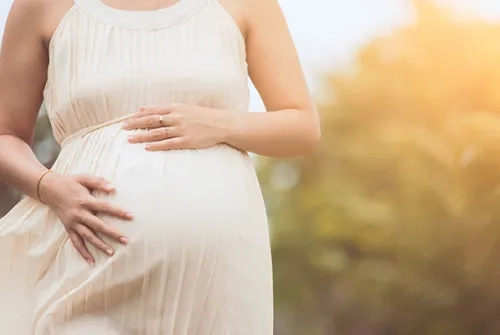Alo Yeditepe
Alo Yeditepe
What Happens at 17 Weeks of Pregnancy?
During the week-by-week pregnancy process, you have entered the 17th week of pregnancy. Your baby's development both excites and makes you curious. So, what happens in the 17th week of pregnancy, what awaits you? What are the 17-week baby's height and weight? What does a 17-week baby look like?
Yeditepe University Hospitals Gynecology and Obstetrics Department Head and IVF Specialist Prof. Dr. Erkut Attar answered.
How Big is a 17-Week Baby?
At week 17, your baby's head-to-butt length has reached 13 cm, and weighs 140 grams. Your baby is the size of an avocado.
Baby Development at 17 Weeks of Pregnancy
During this period, fingerprints continue to develop, and the hearing continues to develop. Toenails also begin to form. The size of the head and body become more harmonious this week. The eyes have moved to the
front of the face and are looking forward. As the baby grows, the umbilical cord between it and the placenta grows and thickens.
1 Question | 1 Answer about Pregnancy
I often have bad dreams after I got pregnant. My friends say it is normal. Is there a scientific explanation for this?
After the second half of pregnancy, several problems arise due to the hormonal and physiological changes caused by pregnancy. The increased blood pumping causes more urine, and the pressure of the uterus on the bladder causes more frequent urination. The growing uterus pushes the diaphragm, heart, and lungs upwards, the heart rate increases and breathing becomes constricted. The nagging reflux in the stomach is added to back pain, lower back pain, and leg cramps. All these unpleasant stimuli not only wake the expectant mother but also change the content of the dream, sometimes turning it into a nightmare. Most dream material consists of elements or symbols that normally have to be expelled from the subconscious mind and which, if they cannot be expelled, cause discomfort. Expectant mothers who drop, forget or lose their babies in their dreams, who transform them into strange creatures and are terrified by them, should not be interpreted but should be told that these are only the result of the physiological changes the mother is going through. Most of the problems will be solved by themselves if quality sleep is ensured with some simple but rational methods, such as not eating heavy and fatty foods after a certain time in the evening, a bedroom with plenty of oxygen, and relaxation exercises.
About
Faculty and Year of Graduation:
Istanbul University, Cerrahpasa Medical School 1986
”
See Also
- Contraceptive Methods: Birth Control and Effective Protection Options
- Genetic Diagnosis in IVF Treatment
- What Happens at 3rd Weeks of Pregnancy?
- What Happens at 2nd Week of Pregnancy?
- What is Endometriosis? What are the Symptoms of Endometriosis?
- What is Pelvic Floor? What are Their Duties?
- The Most Common Diseases in Women
- What is Hysteroscopy? Hysteroscopy Usage Areas
- Early Menopause and Ovarian Failure Can Be Prevented
- Polycystic Ovary Syndrome and its Treatment
- Electromagnetic Stimulation in the Treatment of Endometriosis and Infertility
- Causes of Female Infertility
- Chronic Pelvic Pain
- What is Polycystic Ovary Syndrome/PCOS?
- Postpartum Period
- The Chance of Becoming a Father Increases with Microchip Technology
- Thanks to the Ovarian Rejuvenation Method, She Counts the Days for Birth!
- Some Patients Go Through Menopause Even at the Age of 15
- Useful Bacteria Increases IVF Success
- Polycystic Ovary Syndrome Can Occur If the Bacteria in the Gut Are Not Functioning Well
- Imaging Methods During Pregnancy
- After 16 Years, She Wanted to Be a Mother Again; She Experienced the Shock of Her Life
- These Diseases Affect Women Differently Than Men
- Beware of Chocolate Cyst! It Affects 1 in 10 Women
- Causes of Male Factor Infertility
- The Effect of Advanced Age on IVF Treatment
- Infertility
- Polycystic Ovary Syndrome
- Early Menopause
- Blocked Fallopian Tube
- Vaginismus
- Low Ovarian Reserve (AMH)
- Which Methods Increase Success in Treatment of Infertility?
- Intrauterine insemination (IUI)
- Microinjection
- Egg Cryopreservation
- Assisted Hatching
- Micro-chip
- Pre-implantation Genetic Diagnosis
- Endometriosis
- Co-Culture
- Ovarian Rejuvenation / PRP
- This Problem Ruins the Lives of One in Every 10 Women
- Prof. Dr. Attar: Endometriosis Can Be Associated With Some Chronic Diseases
- What Happens at 38 Weeks of Pregnancy?
- What Happens at 37 Weeks of Pregnancy?
- What Happens at 36 Weeks of Pregnancy?
- What Happens at 35 Weeks of Pregnancy?
- What Happens at 34 Weeks of Pregnancy?
- What Happens at 33 Weeks of Pregnancy?
- What Happens at 32 Weeks of Pregnancy?
- What Happens at 31 Weeks of Pregnancy?
- What Happens at 30 Weeks of Pregnancy?
- What Happens at 29 Weeks of Pregnancy?
- What Happens at 28 Weeks of Pregnancy?
- What Happens at 27 Weeks of Pregnancy?
- What Happens at 26 Weeks of Pregnancy?
- What Happens at 25 Weeks of Pregnancy?
- What Happens at 24 Weeks of Pregnancy?
- What Happens at 23 Weeks of Pregnancy?
- What Happens at 22 Weeks of Pregnancy?
- What Happens at 21 Weeks of Pregnancy?
- What Happens at 20 Weeks of Pregnancy?
- What Happens at 19 Weeks of Pregnancy?
- What Happens at 18 Weeks of Pregnancy?
- What Happens at 16 Weeks of Pregnancy?
- What Happens at 15 Weeks of Pregnancy?
- What Happens at 14 Weeks of Pregnancy?
- What Happens at 13 Weeks of Pregnancy?
- What Happens at 12 Weeks of Pregnancy?
- What Happens at 11 Weeks of Pregnancy?
- What Happens at 10 Weeks of Pregnancy?
- What Happens at 9 Weeks of Pregnancy?
- What Happens at 8 Weeks of Pregnancy?
- What Happens at 7 Weeks of Pregnancy?
- What Happens at 6 Weeks of Pregnancy?
- What Happens at 5 Weeks of Pregnancy?
- What Happens at 4 Weeks of Pregnancy?
- What Happens at 1st. Weeks of Pregnancy?
- Considerations for Embryo Transfer
- What Causes Menstrual Irregularity, How Is It Treated?
- Success in IVF after 43 Decreases to Five Percent
- Does Pregnant Coronaviruses Affect?
- Most Frequently Asked Questions During Pregnancy
- 1 in 10 Women Have This Problem; It Can Lead To Infertility
- Effective Results Can Be Achieved with PRP in Women with Low Egg Count
Alo Yeditepe




